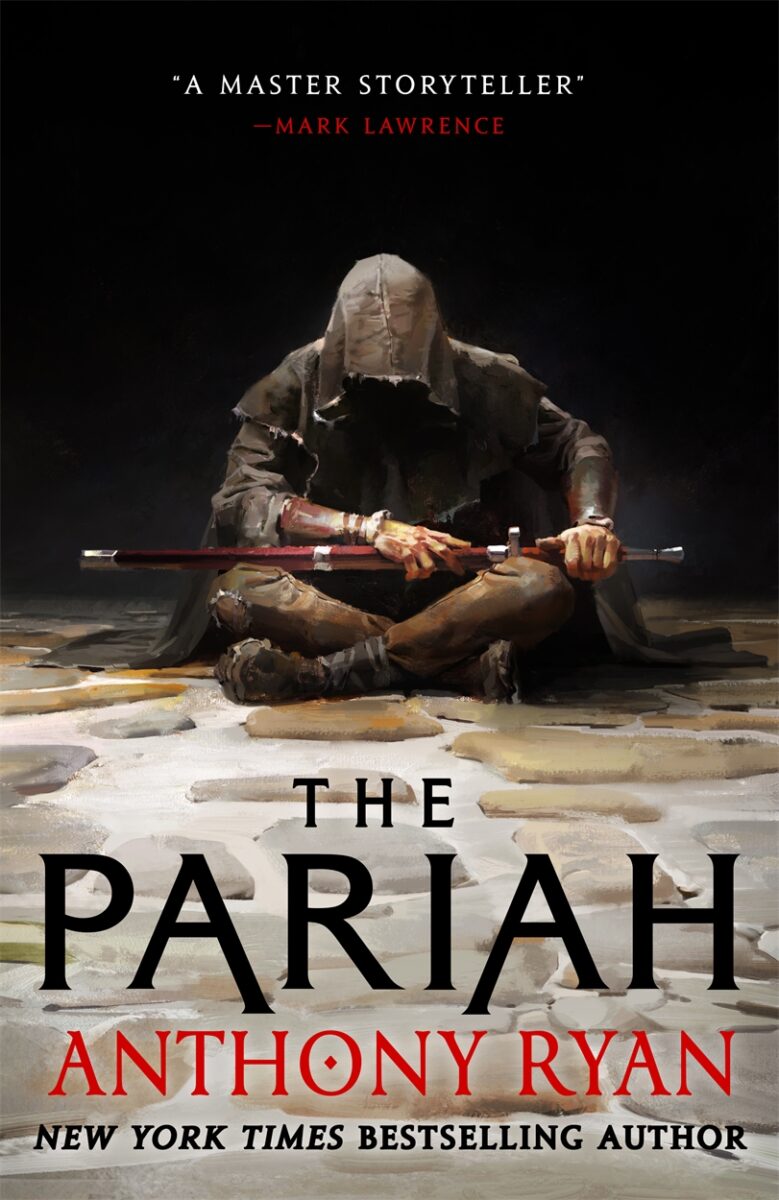Anthony Ryan’s Blood Song was one of those fantasy books I instantly fell in love with when I first got my hands on it, devouring it faster than a pizza in college, without that gross feeling afterward. So it’s difficult not to compare his subsequent books to it. But, of course, when you love work from an author, you sometimes can’t help but compare their new project to it. The Pariah, the first book in The Covenant of Steel series, has Ryan’s signature writing style, and yet it feels like something fresh from him I did not expect. Still, quickly The Pariah stands on its own two feet as far removed from Blood Song as you can get without losing the Anthony Ryan-isms that have become part of his writing style. These quirks of his writing blended into the background because the story became so engaging. It was only after I had finished the book that I could note these familiarities in his writing.
Alwyn Scribe was taken in as a boy by Deckin Scarl, known as an Outlaw King in the kingdom of Albermaine. He was taught in the ways of thievery and murder as part of his gang until a betrayal changes the path his life will walk down. It’s cliche, but the book is a roller coaster. Alwyn is not a hero and is almost nothing like Ryan’s most famous protagonist, Vaelin Al Sorna, except for one regard: loyalty to his few friends to the point of overriding his natural need for self-preservation. A good comparison would be Kinch Na Shnnack of Christopher Buehlman’s The Blacktongue Thief. Both are witty, good in a brawl, quick with a knife, and have a knack for getting themselves into dangerous situations. Where they diverge is Alwyn has a natural emotional intelligence to read people and their true intentions without magic and knows how to control his reactions to stay alive, which is in no way due to magic. The character is just so naturally likable without being a babyface boy scout of a hero. He is a coward, a murderer, a thief, and a liar, yet there is an earnestness to him. He finds an honest tongue in situations you’d expect him to lie through his teeth, showing his true character. He’s not an outlaw with a heart of gold, but neither is he the scum of the earth.

The author plays into all his strengths as a writer in The Pariah that made me love Blood Song. One of those strengths is the supporting cast, specifically how they are used. It isn’t about just writing good characters but how they interweave in Alwyn’s life. People change, leave each other’s lives, move on, and when Alwyn goes someplace new, he meets new people that don’t feel like cut and paste for the previous people in his life. The way Ryan can introduce a side character into Alwyn’s life, have them organically leave it, and then return again for an integral moment of the plot are the moments I get excited for in his books. It makes me feel rewarded for knowing who the character is or surprised in a positive way when the story reveals who they were. Ryan’s other strength is something I always examine in every review, worldbuilding. There is nothing inherently wrong with exposition when it’s done well, but that is not a worry with The Pariah. The book has a framework of Alwyn telling us, the reader, the story from after the events have already happened. Still, it never goes too heavy-handed with the knowledge he already knows. Exposition is never delivered beyond what Alwyn would know, and a lot of the world’s history is delivered through relevant dialogue. It leaves you with a feeling of learning about the world, its people, and politics without reading a history book.
I’m putting on my honesty hat here. I am very tired of the military warfare of the middle ages in fantasy. Yet The Pariah and Anthony Ryan’s books, in general, do it so well that I did not roll my eyes when Alwyn found himself becoming a soldier. Two things help in this regard. First, Anthony Ryan has always had a gift of writing battles from the perspective of his protagonist. He did so with Vaelin and now Alwyn, albeit very different people in very different positions of class, training, and privileged education. The other is that Ryan never lets his battles outstay their welcome. That is a critical point: even though there is a war going on in the kingdom of Albermaine, it doesn’t take up the majority of the plot. Ryan hardly ever goes for the big twist in his novels that have you hollering curses out loud, but little twists that leave you worried whispering “ohfuckohfuckohfuck” worried what the larger implications of these little twists will be. Instead, a series of events will happen that do not seem interconnected, merely part of the path Alwyn has to walk down to get his revenge. In fact, they are part of a puzzle grander in scale where we, the reader, see the pieces filled in reach the end. When the final piece is placed and we see the whole picture only to realize this is only one section of a much larger puzzle, the anticipation for the next book in the series is tantalizing without feeling unsatisfied with the first.
The Pariah, the first book of The Covenant of Steel series by Anthony Ryan, is one of those books that the more I think about it after I’ve finished it, the more I love it. It has many of Anthony Ryan’s strengths as a writer while feeling fresh and new from his previous work. The second book cannot get into my hands soon enough.
Joshua was provided an advance copy of the book by Orbit books.
If you liked this review please consider buying the reviewer a coffee.
Follow Joshua MacDougall @FourofFiveWits on Twitter.
